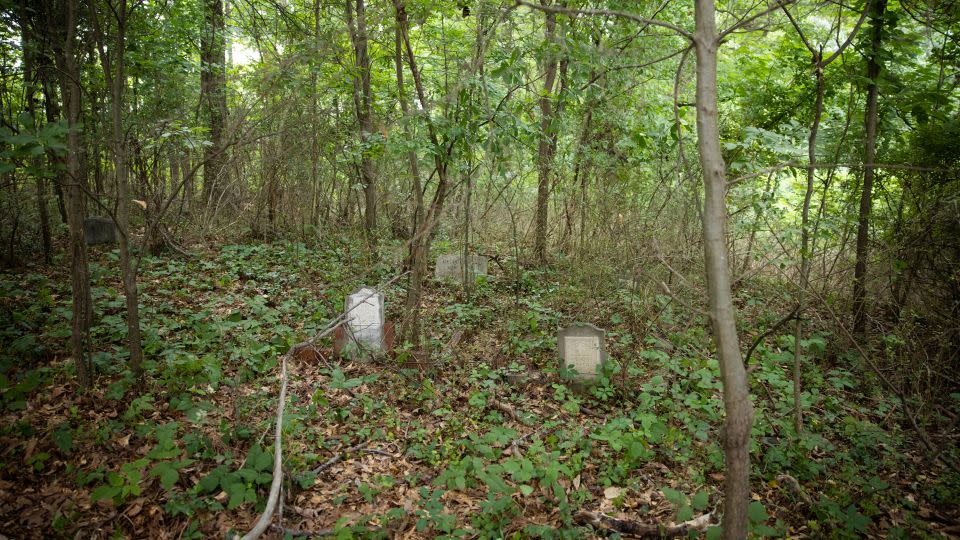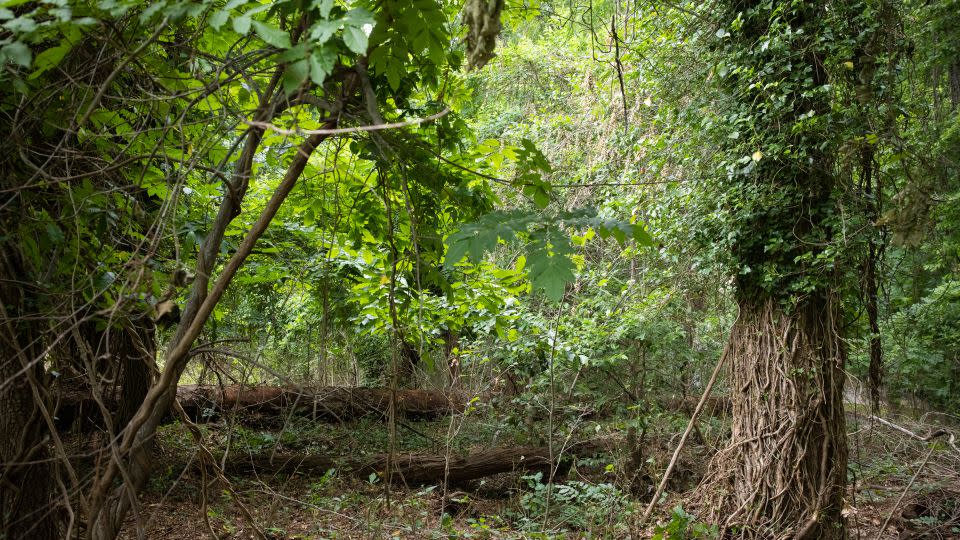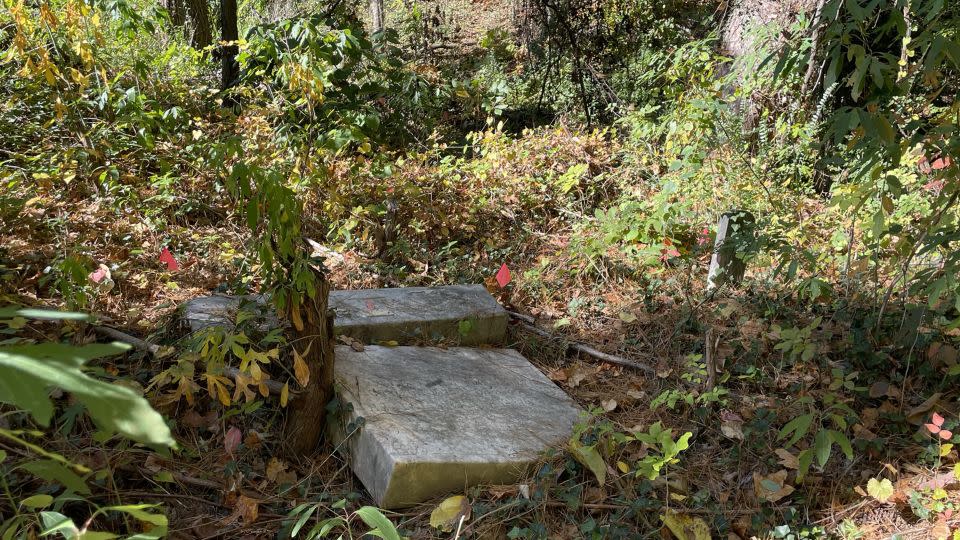Sisters sue a luxury townhome community’s HOA in effort to save a historic Black cemetery
Audrey Collins looks longingly up the hill towards her grandmother’s grave.
The pathway to get there is impassible for the 71-year-old, who would need to climb over fallen trees and overgrown vines to reach the headstone, which itself may not even be visible in the forest’s current condition.
Collins’ memories are the only gateway to recognize this land for what it is: Piney Grove Cemetery, a historic Black cemetery on a 1-acre plot nestled in the heart of Buckhead, an upscale enclave in Atlanta, that’s been nearly lost but never forgotten.
The cemetery is at the center of a lawsuit brought by descendants of people buried there against the homeowners association that owns the property. The lawsuit alleges the luxury townhomes’ HOA has failed to maintain the property as required, allowing nature to envelop the site and render it almost unrecognizable.
“It rubs on my heart heavily. I can still remember my grandmother’s funeral. It was a rainy day, and I can just see it,” Collins recalls.
Standing with her sister Rhonda Jackson, the two reminisce over family members buried there – 11 that they know of – and their shock upon rediscovering the cemetery in total disarray.
“I have a great-grandmother, grandmother, grandaddy and a younger brother that’s in the cemetery … but we know there’s more,” Jackson said.
“There are some detached headstones,” Collins added, “One was my grandfather’s, and we’ve since been able to locate the headstone, but it’s nowhere near where I remember it should be. But at least we found it.”

A hub for Black communities
At the beginning of the 20th century, Piney Grove Cemetery was part of a thriving African American community.
The earliest burials there date back to the 1800s and, of the more than 300 graves, some are believed to have been for enslaved people, according to the Georgia Trust for Historic Preservation.
Owned by Piney Grove Baptist Church, Jackson said it was a hub for several Black communities who settled in this part of Georgia in the decades after Emancipation.
Today the land is owned by The Bluffs at Lenox Homeowners Association, a luxury townhome complex that sits next to Georgia 400, a busy state highway that connects the northern and central parts of metro Atlanta.
“African Americans, when they came over to this country, they didn’t have a name. They don’t know who they are,” Jackson said. “And when they gave us a name, the cemetery tells the story of the tracing back to where those people are from and what communities.”
Collins and Jackson say they have tried to clean the cemetery with a small group of supporters multiple times over the years, since at least 2020, without receiving any offers of help from the HOA.
One year, out of desperation, they brought in a herd of goats to eat the overgrown brush. According to the sisters, that method proved effective until they ran into disagreements with the HOA because at least one goat ended up in a resident’s yard.
Who’s responsible for maintenance?
The sisters then decided to take a legal approach and filed a civil lawsuit in January against The Bluffs at Lenox Homeowners Association.
According to the complaint, Piney Grove Baptist Church bought the land including the cemetery in 1899, then sold part of the land more than 100 years later, in 2002, to a developer.
The developer tried to relocate the cemetery in 2006 but stopped due to “opposition from descendants and local officials,” the complaint reads.

Subsequently, the developer promised the cemetery would be maintained for the benefit of both the townhome owners and the community if “the City of Atlanta let it proceed with a luxury townhome development neighboring the Cemetery,” according to the complaint.
The Atlanta City Council approved an ordinance for “the requested development provided that the developer met the maintenance and access conditions,” the complaint states, arguing the responsibility for maintaining the cemetery lies with the HOA.
But the HOA argues the cemetery was abandoned before it acquired the land and, until recently, no one took responsibility for maintaining it.
“The plaintiffs themselves had been to the cemetery when they were children and had not been back in years, and when they got back it was overgrown and it was difficult to find grave markers and boundaries,” Kathryn Whitlock, the attorney for the HOA, said during a court hearing in February.
The Bluffs at Lenox Homeowners Association declined to comment to CNN while the litigation is ongoing.
A crucial concern for the HOA, as expressed by Whitlock in court, is liability. Since the HOA owns the land the cemetery is on, it could be liable for any accidents that might take place during the clearing process. Also, the question of what responsibility the HOA has for maintaining the cemetery remains a one that both parties are waiting on the judge to decide.
The lawsuit seeks a declaration from the court that Piney Grove is a public cemetery and an injunction mandating the HOA maintain and provide access to the cemetery. It also seeks an award of damages.
Losing the cemetery is losing identity
As the legal battle continues, the thick vegetation at the cemetery keeps growing, continuing to make access difficult.
“I couldn’t right now,” Collins said when asked whether she could get to her grandmother’s grave. “It’s too treacherous going up the hill. I’m 71, almost 72, with a bad hip.”
“We lose our identity,” Collins said as she looked at remnants of engraved rocks that at one point were attached to headstones but are now strewn all over the ground. “It’s an enormous window to the past and we can’t let it die. We just can’t let this go on.”
John Wesley Wright Senior, a childhood friend of Collins and Jackson as well as a descendant of someone buried in the Piney Grove Cemetery, said he feels it’s his rightful duty to make sure the graves are taken care of.
“It makes me feel violated to see my ancestors, my grandmother buried out here,” he said. “It’s hurtful that the overgrowth has taken place. It shouldn’t be like this going to a final resting place. You should be able to rest. Are they resting? No.”

Decades of displacing Black communities
While the cemetery occupies a small plot of land, the case is about something much bigger, said Wright Mitchell, president and CEO of the Georgia Trust for Historic Preservation.
From Mitchell’s perspective, the cemetery is one of the last tangible links connecting African Americans to their ancestors and the thriving communities that were displaced over several decades.
“That’s been going since Emancipation where African American communities are displaced through a measure of different tactics (like) development,” Mitchell said.
The cemetery is “one of the last vestiges of the several African American communities that once thrived in the area including Piney Grove, Lynwood Park, Bagley Park, Johnsontown and Armour,” the trust said when announcing Piney Grove is included on its 2024 list of 10 Places in Peril in the state.
Beyond the legality of who is responsible for maintenance, or the massive effort to preserve the cemetery’s historical significance, Collins said she’s fulfilling a promise she made.
“I get emotional because on the very first cleanup, I promised my Grandma when we cleaned her grave. I said, ‘I promise you, this is not going to happen again, we’re going to make sure you’re treated with respect.’”
For more CNN news and newsletters create an account at CNN.com


